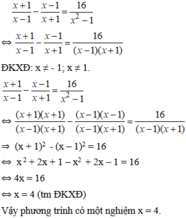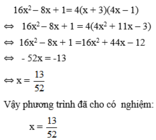
Hãy nhập câu hỏi của bạn vào đây, nếu là tài khoản VIP, bạn sẽ được ưu tiên trả lời.


\(1,A⋮B\Leftrightarrow x^3-3x^2-ax+3=\left(x-1\right)\cdot a\left(x\right)\)
Thay \(x=1\)
\(\Leftrightarrow1-3-a+3=0\\ \Leftrightarrow a=1\)
\(2,A⋮B\Leftrightarrow3x^3-16x^2+25x+a=\left(x^2-4x+3\right)\cdot b\left(x\right)\\ \Leftrightarrow3x^3-16x^2+25x+a=\left(x-3\right)\left(x-1\right)\cdot b\left(x\right)\)
Thay \(x=1\)
\(\Leftrightarrow3-16+25+a=0\\ \Leftrightarrow a=-12\)
Thay \(x=3\)
\(\Leftrightarrow3\cdot27-16\cdot9+25\cdot3+a=0\\ \Leftrightarrow81-144+75+a=0\\ \Leftrightarrow12+a=0\Leftrightarrow a=-12\)
Vậy \(a=-12\)



ĐKXĐ : 1- 2x ≠ 0 và 1 + 2x ≠ 0 ⇔ x ≠ 1/2 và x ≠ -1/2
(khi đó 1 – 4x2 = (1 – 2x)(1 + 2x) ≠ 0)
Quy đồng mẫu thức hai vế :


Khử mẫu, ta được : 32x2 = -8x – 16x2 – 3 + 6x – 24x + 48x2
⇔ 26x = -3 ⇔ x = -3/26 (thỏa mãn ĐKXĐ)
Tập nghiệm của phương trình : S = {-3/26}

4) Ta có: \(\dfrac{2x-5}{5}-\dfrac{x+3}{3}=\dfrac{2-3x}{2}-x-2\)
\(\Leftrightarrow\dfrac{6\left(2x-5\right)}{30}-\dfrac{10\left(x+3\right)}{30}=\dfrac{15\left(2-3x\right)}{30}-\dfrac{30\left(x+2\right)}{30}\)
\(\Leftrightarrow12x-30-10x-30=30-45x-30x-60\)
\(\Leftrightarrow-22x-60=-75x-30\)
\(\Leftrightarrow-22x+75x=-30+60\)
\(\Leftrightarrow53x=30\)
\(\Leftrightarrow x=\dfrac{30}{53}\)
Vậy: \(S=\left\{\dfrac{30}{53}\right\}\)
5) Ta có: \(\dfrac{5x-3}{6}-\dfrac{7x-1}{4}=5\)
\(\Leftrightarrow\dfrac{2\left(5x-3\right)}{12}-\dfrac{3\left(7x-1\right)}{12}=\dfrac{60}{12}\)
\(\Leftrightarrow10x-6-21x+3=60\)
\(\Leftrightarrow-11x-3=60\)
\(\Leftrightarrow-11x=63\)
\(\Leftrightarrow x=-\dfrac{63}{11}\)
Vậy: \(S=\left\{-\dfrac{63}{11}\right\}\)
`9,x^3+x^2-2=0`
`x^3-x^2+2x^2-2=0`
`<=>x^2(x-1)+2(x-1)(x+1)=0`
`<=>(x-1)(x^2+2x+2)=0`
`<=>x=1`
`14,x^2-2x+1=0`
`<=>(x-1)^2=0`
`<=>x-1=0`
`<=>x=1`
`15,x^3+3x^2+3x+1=0`
`<=>(x+1)^3=0`
`<=>x+1=0`
`<=>x=-1`

Bài 6:
1) Ta có: \(2x\left(x-5\right)-\left(x+3\right)^2=3x-x\left(5-x\right)\)
\(\Leftrightarrow2x^2-10x-\left(x^2+6x+9\right)=3x-5x+x^2\)
\(\Leftrightarrow2x^2-10x-x^2-6x-9-3x+5x-x^2=0\)
\(\Leftrightarrow-14x-9=0\)
\(\Leftrightarrow-14x=9\)
\(\Leftrightarrow x=-\dfrac{9}{14}\)
Vậy: \(S=\left\{-\dfrac{9}{14}\right\}\)
`1)2x(x-5)-(x+3)^2=3x-x(5-x)`
`<=>2x^2-10x-x^2-6x-9=3x-5x+x^2`
`<=>x^2-16x-9=x^2-2x`
`<=>14x=-9`
`<=>x=-9/14`

3x(25x + 15) – 35(5x + 3) = 0
⇔ 15x(5x + 3) – 35(5x + 3) = 0
⇔ (15x – 35)(5x + 3) = 0 ⇔ 15x – 35 = 0 hoặc 5x + 3 = 0
15x – 35 = 0 ⇔ x = 35/15 = 7/3
5x + 3 = 0 ⇔ x = - 3/5
Vậy phương trình có nghiệm x = 7/3 hoặc x = -3/5



⇔ 32 x 2 = - 8x(1 + 2x) – 3(1 + 8x)(1 – 2x)
⇔ 32 x 2 = - 8x – 16 x 2 – 3 – 18x + 48 x 2
⇔ 32 x 2 + 16 x 2 – 48 x 2 + 18x + 8x = - 3
⇔ 26x = - 3 ⇔ x = - 3/26 (thỏa mãn)
Vậy phương trình có nghiệm x = - 3/26 .

ĐKXĐ:
Ta có:


⇔ 4x = 16 ⇔ x = 4.
Vây phương trình đã cho có nghiệm x = 4.

